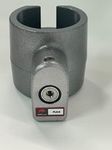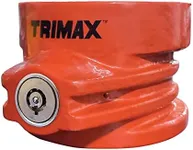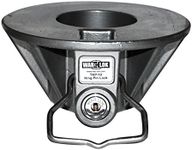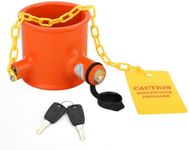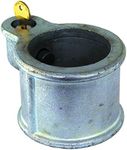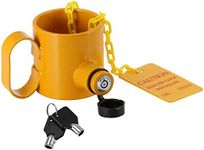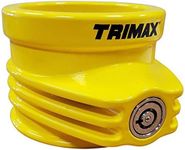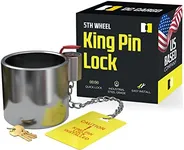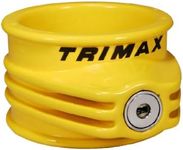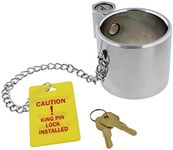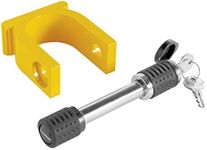Buying Guide for the Best Fifth Wheel Locks
Choosing the right fifth-wheel lock is important for protecting your trailer from theft and ensuring peace of mind when you leave it unattended. Fifth-wheel locks are designed to secure the kingpin of your trailer, making it difficult for unauthorized people to hitch up and drive away. When shopping for a fifth-wheel lock, it's important to understand the key features and how they relate to your specific needs, such as the type of trailer you have, how often you travel, and the environments where you park.Material and Build QualityMaterial and build quality refer to what the lock is made of and how sturdy it is. This is important because a lock made from strong, durable materials like hardened steel will be much harder for thieves to break or cut through. When looking at material, you’ll often see options like steel, aluminum, or alloys. Steel is generally the most secure, while lighter materials may be easier to handle but less protective. If you park in high-risk areas or leave your trailer unattended for long periods, prioritize heavy-duty materials. For occasional use in safer areas, a lighter lock may be sufficient.
Locking MechanismThe locking mechanism is how the lock secures itself to the kingpin and how you unlock it. This is important because a more complex or high-quality mechanism is harder to pick or tamper with. There are basic key locks, combination locks, and more advanced options with anti-pick features. Simpler locks are easier to use but may be less secure, while advanced mechanisms offer better protection but can be a bit more complicated. If you value convenience and quick access, a basic lock may work, but for maximum security, look for advanced mechanisms.
Size and FitSize and fit refer to how well the lock matches your trailer’s kingpin. This is crucial because a lock that doesn’t fit properly won’t secure your trailer effectively. Fifth-wheel kingpins are generally standardized, but there can be slight differences. Locks are often labeled as universal or specific to certain sizes. Always check your kingpin’s measurements and compare them to the lock’s specifications. If you have a standard trailer, most universal locks will fit, but for custom or older trailers, double-check compatibility.
Weather ResistanceWeather resistance means how well the lock can handle exposure to rain, snow, dust, and sun. This is important because a lock that rusts or jams easily won’t last long or may become difficult to use. Look for locks with weatherproof coatings, rubber seals, or stainless steel parts. If you often park outdoors or in harsh climates, prioritize weather-resistant features. For indoor or short-term use, this may be less critical.
Ease of UseEase of use covers how simple it is to install, remove, and operate the lock. This matters because a lock that’s too complicated or heavy can be frustrating, especially if you use it frequently. Some locks are designed to be tool-free and quick to attach, while others may require more effort. If you plan to use the lock often or have limited strength, look for user-friendly designs. If maximum security is your main concern, you might accept a bit more complexity.
Visibility and DeterrenceVisibility and deterrence refer to how noticeable the lock is to potential thieves. A brightly colored or bulky lock can act as a strong visual deterrent, making thieves less likely to target your trailer. Some locks are designed to be highly visible, while others are more discreet. If you want to discourage theft before it starts, choose a lock that stands out. If you prefer a subtle look, a less visible lock may be better, but keep in mind it may not deter as effectively.

